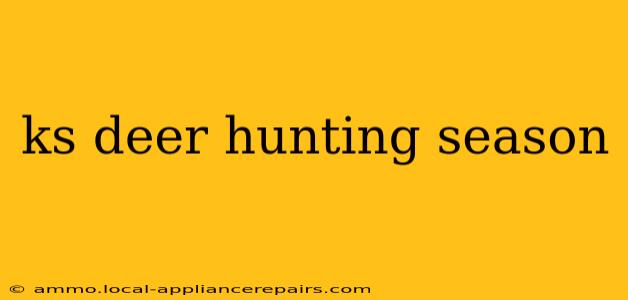Kansas boasts a thriving deer population, making it a prime destination for hunters across the country. Understanding the intricacies of the KS deer hunting season is crucial for a successful and safe hunt. This guide provides a comprehensive overview of the regulations, strategies, and essential information you need to know before heading out into the Kansas fields.
Understanding the Kansas Deer Hunting Regulations
The Kansas Department of Wildlife, Parks and Tourism (KDWPT) governs all deer hunting activities within the state. Regulations are subject to change, so always consult the official KDWPT website for the most up-to-date information before your hunt. Key aspects to understand include:
Hunting Licenses and Permits:
- Resident vs. Non-Resident Licenses: Kansas offers both resident and non-resident hunting licenses. Requirements and fees differ significantly. Be sure to obtain the correct license based on your residency status.
- Deer Permits: In addition to a hunting license, you'll need a deer permit. These permits often have restrictions on the number of deer you can harvest and the specific hunting methods allowed. Permits are often drawn through a lottery system. Understanding the application deadlines is vital.
- Antlerless Permits: These permits allow the harvest of female deer and are often managed to control population numbers. The availability of antlerless permits can vary by hunting unit.
Hunting Seasons and Zones:
Kansas is divided into various hunting zones, each with its own specific hunting seasons and regulations. These seasons are typically broken down into:
- Archery Season: This season usually runs for several months and allows the use of archery equipment.
- Muzzleloader Season: A shorter season dedicated to muzzleloader firearms.
- Firearms Season: The most popular season, allowing the use of various firearms, usually with specific caliber restrictions.
- Late-Season Hunts: Some areas may have extended hunts later in the year.
Weapon Restrictions:
Kansas has specific regulations regarding the types of firearms and ammunition allowed during each hunting season. Always double-check the legal calibers and restrictions for the specific zone and season you plan to hunt. Knowing what is and isn't permissible will prevent legal issues.
Bag Limits:
The number of deer you can legally harvest is dictated by your permit and the hunting zone. Understanding your bag limit is paramount to avoiding violations.
Safety Regulations:
Hunter safety is a top priority. Kansas requires hunters to follow specific safety regulations, including:
- Hunter Education: Many hunters, particularly youth, are required to complete a hunter education course.
- Tree Stand Safety: If using a tree stand, adhering to strict safety procedures is crucial to prevent falls.
- Firearm Safety: Always handle firearms responsibly and follow safe gun handling practices.
Strategies for a Successful Kansas Deer Hunt
Successful deer hunting in Kansas requires preparation, knowledge, and a bit of luck. Here are some key strategies to consider:
Scouting:
Pre-season scouting is crucial. Identify areas with good deer sign, such as tracks, droppings, rubs, and scrapes. Knowing the terrain and potential deer movement patterns significantly increases your chances of success.
Understanding Deer Behavior:
Learn about deer habits, food sources, and movement patterns. This knowledge will help you position yourself strategically for a successful hunt. Understanding the rutting season is key for maximizing your opportunities.
Choosing the Right Hunting Method:
Kansas offers various hunting methods, including archery, muzzleloader, and firearms hunting. Select the method that best suits your skills and the hunting area. Consider stand hunting, stalking, or still hunting depending on your hunting style and the environment.
Gear and Equipment:
Ensure you have appropriate clothing, camouflage, and hunting gear suitable for the conditions. Proper gear enhances both your comfort and safety.
Ethical Hunting Practices
Ethical hunting is paramount. Always practice responsible hunting techniques, including:
- Respecting Property Rights: Obtain permission from landowners before hunting on private property.
- Following Fair Chase Principles: Hunt ethically and avoid practices that unfairly advantage the hunter.
- Proper Game Care: Ensure you properly field dress and handle harvested deer to minimize spoilage.
By thoroughly understanding Kansas deer hunting regulations, employing effective hunting strategies, and practicing ethical hunting, you'll significantly increase your chances of a successful and memorable hunting experience. Remember to always prioritize safety and adhere to all KDWPT guidelines.

